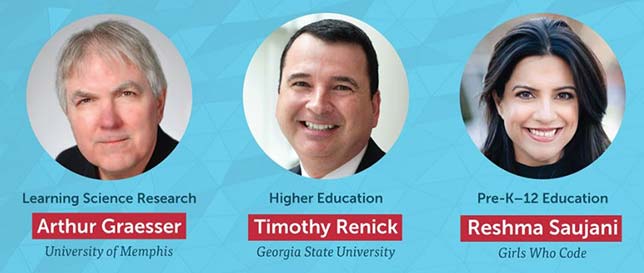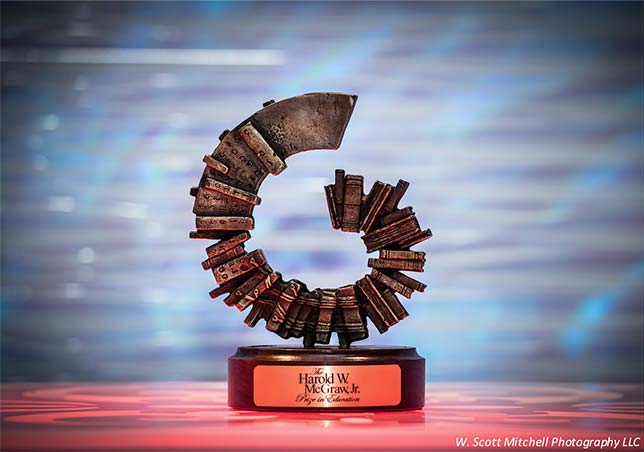Recipients of 2018 McGraw Prize in Education Revealed
- By Dian Schaffhauser
- 03/19/18
Next month's ASU+GSV Summit in San Diego is the venue where three people will be recognized for their innovative contributions to education. They include an individual who has brought coding to girls, another who has dived into the science of learning and a third who has used data to increase student achievement at his university.
The Harold W. McGraw, Jr. Prize in Education, administered through an alliance between the McGraw Family Foundation, McGraw-Hill Education and Arizona State University, is given each year to people who have not only dedicated themselves to improving education through innovative approaches but also found success.
This year's winners are Arthur Graesser, a professor in the Department of Psychology and the Institute of Intelligent Systems at the University of Memphis, who is being recognized with the first "Learning Science Research" prize; Timothy Renick, a senior vice president for student success at Georgia State University, who will receive the Higher Education award; and Reshma Saujani, founder and head of Girls Who Code, recognized for her work in pre-K–12 education.

2018 Harold W. McGraw, Jr. Prize Winners. Source: McGraw-Hill Education
Each winner will receive $50,000 and an "iconic" McGraw Prize bronze sculpture.

The McGraw Prize. Image by W. Scott Mitchell Photography.
"Art, Tim and Reshma have demonstrated that the potent combination of hard work and creative vision can create new opportunities for students to succeed and unlock the potential of learners anywhere," said Lloyd "Buzz" Waterhouse, interim president and CEO of McGraw-Hill Education. "I congratulate these three educators for their accomplishments and hope that their stories will inspire future leaders to make a difference."
The winners were first nominated by members of the public, then chosen by a group of jurors in each category.
Previous winners have included Anant Agarwal, the CEO of MOOC provider edX; Wendy Kopp, the founder Teach for America; and Salman Khan, who created Khan Academy.
Graesser has worked to integrate the fields of psychology, education, computer science and linguistics in creating "intelligent" tutoring systems to help students understand difficult concepts and manage their emotions as they tackle them. His work has led to the development of numerous learning systems, including AutoTutor and DeepTutor among others.
Renick's work at Georgia State over the last decade has increased access and student diversity by enrolling one of the largest Pell Grant populations in the country while simultaneously ramping up graduation rates and reducing achievement gaps based on student race, ethnicity and income level. The institutional graduation rate has improved 22 percentage points. Rates are up 28 percentage points for African-Americans (to 57 percent) and 34 points for Latinos (to 56 percent).
Saujani's non-profit offers multi-week coding camps for girls during the summer, as well as after-school clubs to help young women gain coding experience and confidence. By the end of this school year, Girls Who Code expects to have have reached 50 thousand girls in all 50 states and several U.S. territories.
About the Author
Dian Schaffhauser is a former senior contributing editor for 1105 Media's education publications THE Journal, Campus Technology and Spaces4Learning.